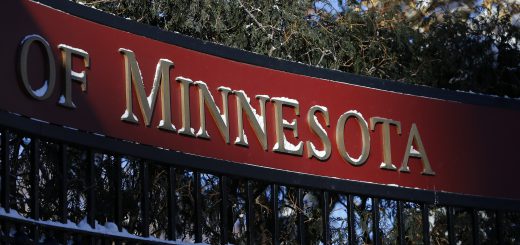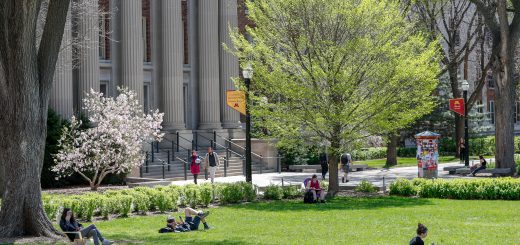Working in the wrong direction?
Students with full-time jobs sometimes struggle to pursue career-related experiences.

By Lew Blank
Last fall, before the coronavirus sidelined her life, Sami Payne worked 38 hours a week while balancing a full-time course load of 18 credits. In between classes, she served as a Starbucks barista, a volleyball coach and a waitress at a Middle Eastern restaurant.
Her schedule forced her to regularly lose sleep and occasionally sacrifice social opportunities to pay for rent, groceries and college tuition. But in December, when she was offered a 12-hour-a-week gig as an unpaid nutritionist intern for the football team, she added it to her schedule.
The health and wellness major knew the position would advance her career development. It was worth it, she said, even though working 48 hours per week on top of her courses might undermine her own health and wellness.
“I know it’s gonna be extra stress and everything, but I need it for my future,” she said. “I need that extra experience.”
Payne’s dilemma is one faced by many students who work full-time or nearly full-time hours, which certainly includes those whose paths have been nontraditional. Should they keep a manageable schedule by turning down a career-building opportunity, or accept it and make life even more stressful?
The University of Minnesota states on its website that gaining career experience is an essential part of a student’s education. “Employers prefer college students to not only be knowledgeable in their field of study, but to also have real-world, practical experience in their chosen field by the time they graduate,” the website says.
This claim is backed up by research. A survey from the National Association of Colleges and Employers found that nearly two-thirds of employers — 65% — prefer to hire candidates with “relevant” work experience, while just 26% said they preferred any type of work experience, regardless of its relevance to the position.
But getting that experience while carrying a full academic credit load and working nearly a full-time schedule can be almost impossible. Payne was able to make time for her unpaid internship between class and her three other jobs, but only by rigorously planning out her schedule — from homework time at 5 a.m. to getting off work at 10 p.m.
Other students choose not to make this sacrifice.
Stephanie Serbu, an anthropology and political science major who works 30 hours a week as a waitress, used to serve as an unpaid community organizer for Outdoors Club, an environmentally focused student group. The position allowed her to make strategic decisions in a professional setting and have leadership over the group’s actions, which are opportunities she didn’t have as a waitress.
But when her mom lost her job, financial concerns prompted her to withdraw from the club to increase her hours as a waitress.
“I really do love and enjoy being there and working with those people, so that [was] really unfortunate,” she said about leaving Outdoors Club.
Jacob Smiley, a history major who works 40 hours a week as a custodian and research assistant, had a similar experience. Although he’s been able to serve in the University’s Student Senate — an unpaid position that requires an additional six- to seven-hour commitment per week — he’s had to forego unpaid experiences that would have been beneficial to his career development, including student groups like Interdisciplinary Perspectives on International Development.
Even for the one unpaid experience he’s made time for — his role as a student senator — Smiley said that he rarely has time to explore the job’s creative possibilities.
“It would be nice to be able to commit more time to…have a creative time slot to think broadly about [Student Senate] activities,” he said. But with a full-time workload, fully realizing the opportunities of the position can be impossible.
Payne, Serbu and Smiley aren’t alone. Two in five undergraduate students nationwide work at least 30 hours a week, according to a 2015 report from Georgetown University’s Center on Education and the Workforce. This is largely due to the soaring cost of higher education in the U.S., which can pressure some students to work longer hours.
It’s not all doom and gloom, however, for full-time student workers who miss out on career-related experiences. While college graduates who lack these experiences may be less attractive to some employers, the act of working long hours itself can be a marketable skill.
“Balancing a full course load with a full-time job has likely given the student a chance to build strong time management and organizational skills,” Maggie Heier, director of career services at the College of Liberal Arts, said in an email. “This could be highlighted in interviews.”
That’s the experience of Emily Van Koningsveld, a psychology major who works 32 hours a week as a manager at Target. Although her intense workload has led to stress and has sometime detracted from her focus on schoolwork, some of her responsibilities at Target have been valuable even though they’re not directly related to her major.
“I feel like my job is the equivalent to an internship,” she said. “I’m a key holder. I make sure everything is secure. I manage people…I feel like the experiences I’m getting through my job are valid.”



